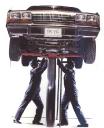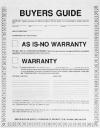Used Car Warranties: Change Your Oil Less Often

Contrary to everything you’ve been told, changing your oil every 3000 miles may no longer be the rule of thumb.
Due to advanced engine design and better quality oil the old maxim may be a couple thousand miles off the mark.
“Ford Motor Co. became the latest manufacturer to extend its oil life guidelines, making public that it is raising the recommended oil change interval from 5,000 miles to 7,500 on its newly redesigned 2007 models and all subsequent redesigned or new models.
The company, like many other manufacturers, said Tuesday that higher oil quality standards and new engine designs were responsible for the change, which affects vehicles driven under normal conditions.
“The oils have advanced a lot since the days when 3,000 miles were the typical oil drains,” said Dennis Bachelder, senior engineer for the American Petroleum Institute, an industry organization that sets quality standards. “They’re certainly more robust than the oils of 10, 15 years ago.”
These days, motor oils start with a higher-quality base oil than in the past, and they have more antioxidants that make lubricating properties last longer and other additives that keep deposits from forming on engines, Bachelder said.
Pete Misangyi, Ford’s supervisor of fuel lubricants, said the company conducted numerous fleet and laboratory tests with newer oils before it raised the interval.
“That allows more comfort, if you will, in extending the intervals using the new oils,” he said.
(Source)
Many manufacturers are recommending sensors to calculate when a vehicle needs an oil change but find that customers would rather have a set intervals of miles recommended as opposed to trusting a sensor even though data confirms their reliability.
“We are absolutely confident of the technology. We back it with a 100,000 mile powertrain warranty now, so there’s no doubt in our mind that this technology works,” he said.
The longer oil life can save customers money. Ford estimates that drivers would save $600 over a five-year period by going from 5,000 miles to 7,500 between oil changes.
“From an environmental perspective we can save an enormous amount of oil,” Lord said. “There’s no point in wasting precious oil changing it prematurely. And we don’t have to dispose of so much waste oil, either.”











